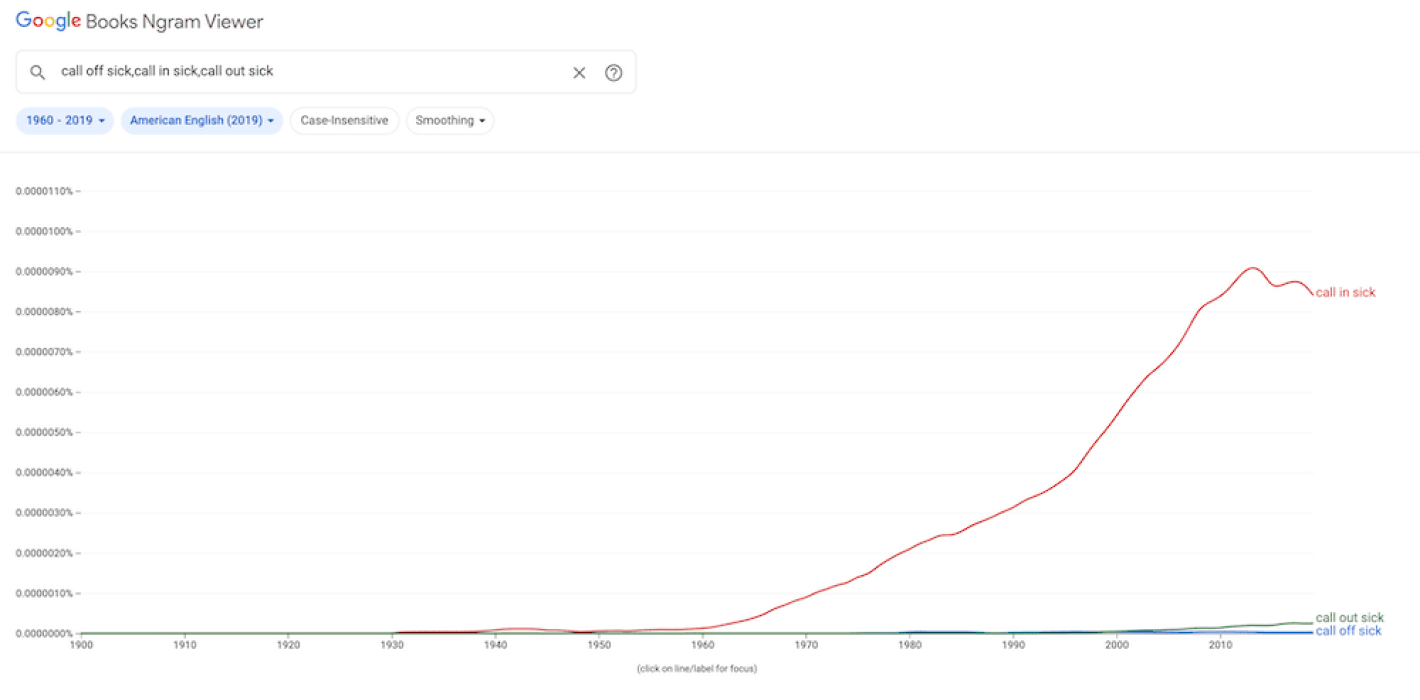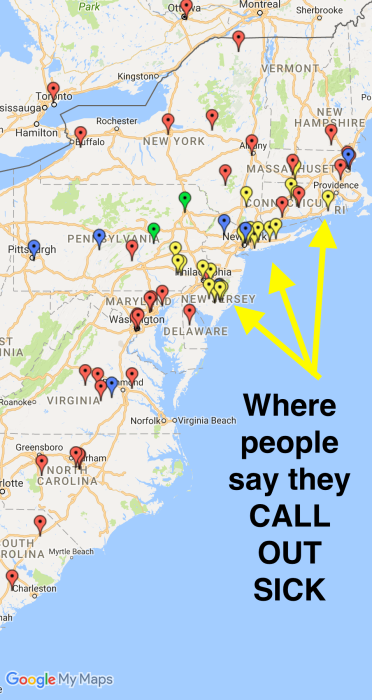Calling Out Sick Then Calling Again to Come in
Nosotros are currently experiencing playback issues on Safari. If you would like to listen to the audio, please use Google Chrome or Firefox.
Hide player
MAP KEY: cherry-red=phone call in ill. yellow=call out sick. green=call off sick. blue=mixed.
Caller Question: "How-do-you-do, Grammar Girl. This is Ellen from Newark, California. I have a question. I am 60 years onetime, and I e'er use the phrase or heard the phrase 'calling in sick' if I couldn't make information technology to work. Or if someone couldn't make it to work, they would call in to say they were sick and couldn't come to work. But in recent years, like within the last 10 years, I have heard family members say they're 'calling out' and that sounded very strange to me. Just even today in the 'Washington Post,' there was an commodity and sure enough information technology used the phrase 'calling out sick' because of COVID. Employees are calling out. So I just was curious about the phrases 'calling in ill' and 'calling out ill.' Thanks a lot."
Thanks for the question, Ellen.
I've e'er said "phone call in ill." The way I think of it is that you call in to the function to say you'll exist out ill. And if I phone call in and you take the call, you would tell anybody else that Mignon is going to exist off sick or out sick today.
'Call in Ill' is the near common phrase
Looking at how often these phrases appear in books Google has scanned, I institute that "phone call in sick" is dramatically more common than "call out sick" in both American and British English. In fact, "call out ill" doesn't seem to appear in books categorized as British English at all. And information technology'southward the same when you look at variations like "called" and "calling."

I found the same matter when I looked at the Corpus of Contemporary American English language: "call in sick" shows up about 100 times more than often than "call out sick" (307 versus 3). That database does have more coincidental sources than the Google Books database, like transcripts from movies and Telly shows, merely I wondered if maybe in even more casual use, like on Twitter, I'd find "call out ill" more than frequently. And I did, but information technology was still 10-to-1 in favor of "call in ill" (61 versus 6 in a 4-hour menstruum in the center of the day, Pacific time).
No matter where I looked, "call in sick" won large time in the big picture.
However, back in 2009, I posed this question to my followers on social media and made a map of their responses because they did study something of a regional departure.
Variations are regional and possibly based on corporate culture
I noticed a few interesting things while I was going through the responses to brand the map:
- "Calling out ill" seems to be well-nigh common in New York, New Jersey, and Connecticut, although it is heard a chip in other places.
- A very small number of people (about half dozen respondents) said they say they "call off sick," which I had never heard before. It was too few people to say anything definitive, but they seem to exist scattered across a region from Illinois to Pennsylvania that linguists sometimes call the Inland Northern region. "Telephone call off ill" does testify upward in American English books in Google Books, but at a charge per unit dramatically lower than even "call out sick."
- Among the initial responses, a few people said they had worked at different companies in the same city, and at ane visitor everyone said they telephone call in sick, and at another company everyone said they telephone call out sick, which led me to suspect that corporate culture or traditions play a office along with regional differences. And follow-up posts on the original map convinced me even more that corporate civilization plays a role. I'm not sure whether regionalisms are behind the corporate civilization aspect though. For example, information technology could be that the homo resources departments for the companies that foster a civilization where people say they "call out ill" are located in the regions where that diction is more common or that the departments are led by people who moved from a place where that diction is more common. I just can't tell.
These different sayings aren't correct or incorrect. It's similar proverb y'all stand on line instead of saying you stand in line. They're idioms, and they may sound weird to those of u.s.a. who don't live nearly where i of the other is said, simply they aren't incorrect. Some idioms are just different in some parts of the country.
Did people call in ill before 1960?
Another matter that stood out to me when I was looking at the graphs from Google Books is that these phrases rarely appeared in whatsoever form earlier 1960. Did people not call in sick to piece of work earlier then? Did they use other words for information technology? I don't know! I posted the question online and although I don't take a definitive reply, people had some interesting ideas and stories.
First, a lot of people wondered whether information technology had to do with the availability of telephones, merely I compared the adoption bend for the telephone to the frequency of people talking about calling in sick to work, and they didn't friction match.
Some other person said that people used to talk more about being absent from piece of work. It looks like that phrase started showing up in government documents around 1930, which makes it hard to tease out its existent usage (considering those documents merely swamp out everything else at Google Books), but when I limit the search to fiction, the phrase "absent from work" was never significant.
What seems more than likely to me is that before 1960, people either didn't accept ill days because labor laws were weaker, and therefore didn't accept time off equally much considering they couldn't afford it, or that people didn't actually need to call in sick for the kinds of jobs they were more likely to have had back then. For example, Amy J. Schneider, an editor friend, says her family unit says it was a common experience until the mid-to-late 1970s that you were simply allowed a fix number of days you could exist absent. For example, at one chore, the boss but went around at the outset of the shift, determined who was or wasn't there, and distributed tasks accordingly.
I'm really curious about this ascent in calling in ill since 1960 or, put some other mode, the lack of calling in ill before 1960, so if you know, please tag me on social media and share your story. This could also be an interesting thing to ask your parents or grandparents well-nigh the next time yous talk to them.

Source: https://www.quickanddirtytips.com/education/grammar/call-in-sick-or-call-out-sick
Postar um comentário for "Calling Out Sick Then Calling Again to Come in"